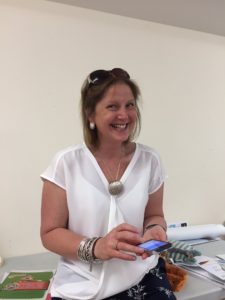This week’s EBN Twitter Chat on Wednesday 15th March between 8-9 pm (UK time) will focus on the role of the health care professional in addressing child health inequalities. The Twitter Chat will be hosted by Kath Evans (@kathevans2) a children’s nurse who works at NHS England and leads on improving experiences of care in maternity, infant, children and young people’s services and Professor Alison Twycross (@alitwy) – editor of Evidence Based Nursing. This Blog provides some context for the Chat.
Participating in the Twitter chat requires a Twitter account; if you do not already have one you can create an account at www.twitter.com. Once you have an account contributing is straightforward, You can follow the discussion by searching links to #ebnjc, or contribute by creating and sending a tweet (tweets are text messages limited to 140 characters) to @EBNursingBMJ and add #ebnjc (the EBN chat hash tag) at the end of your tweet, this allows everyone taking part to view your tweets.
I love listening to Desert Island discs as I run (admittedly at a pretty slow pace) around my local park, it was Dame Carol Black and her desert island discs that got me running again back in February 2016. She’s still running in her 70s, and as I’m in my 40s I didn’t think I had any excuse not to lace up my running shoes and get plodding!
However it was Sir Michael Marmott’s desert island discs podcast (who published ‘Fair Society, Healthy Lives’ ‘The Marmot Review’ ) that got me thinking that we now know so much about child health inequalities and the reasons for them, and yet they continue to exist.
As health care professionals we also see child health inequalities day in day out on our wards, in schools, A&E or Urgent Care centres in fact anywhere where healthcare is delivered. The infant brought in dead having suffocated after co-sleeping, the 4 year old drinking cola from a bottle whilst being admitted for dental extractions due to tooth decay, the obese five year old, the 8 year old awaiting a child protection medical so malnourished and with hair so matted and infested that the play specialist and nurse spend hours bathing and treating her with such kindness that shines a light on compassion in practice and exemplifies the non-judgemental attitude of health care professionals, whilst knowing the social deprivation many of the children are facing.
The evidence starkly states that poor children have worse health outcomes. The Royal College of Paediatrics and Child Health in their State of Child Health Report share that nearly one in five children in the UK is living in poverty with those from the most deprived backgrounds experiencing much worse health compared with those who are more affluent. The child welfare inequality project shares 1 in 60 children are taken into care in the most deprived areas compared with 1 in 660 in the wealthiest, highlighting that poverty is the biggest influence on rates of children being taken into care, it states ‘parenting is much harder if you do not have enough money to provide for the essentials of food, housing heating and clothing.’ The BMA in ‘Growing up in the UK ensuring a healthy future for our children’ suggest that Charles Dickens would have railed against the rising levels of child poverty and the increasing unfairness in life chances among the UK’s children.
Professor Nina Modi, President of the RCPCH states ‘Poor health in infancy, childhood and young adult life will ultimately mean poor adult health and this in turn will mean a blighted adult life and poor economic productivity’
Reducing inequalities for and with children, young people and families has to be a critical priority for government, but what’s our role as health care professionals in addressing these challenges? Do we have a role?
The Twitter chat on the 15th March from 8-9pm will explore this issue further, asking
- Where are the best sources of knowledge and evidence on child inequalities?
- What data/narrative is most compelling that you need to share?
- How do we increase the knowledge of health care professionals relating to child inequalities?
- What’s our role in speaking up about the health inequality challenges that we see in our practice?
- If ensuring people have ‘control’ over their lives has such an impact how can we consistently do this?
- How are we creating opportunities for young people to participate, volunteer & gain employment in the NHS?
- Who can we signpost children, young people and families to when assistance is needed?
- How does Health strengthen our links with education?
- What role so STPs Sustainability and Transformation Plans have in addressing child health inequalities?
- What personal action can you take?
Further reading
Marginalised young people – Association for Young People’s Health http://www.youngpeopleshealth.org.uk/marginalised-young-people
Twitter accounts to follow
Joseph Rowntree Foundation @jrf_uk
Children’s Society @childrensociety
NSPCC @NSPCC
Who else should we add to this list?
Post chat reflections for CPD purposes
- What learning is most significant for me from this twitter chat?
- What will I do differently/take forward as a result of this twitter chat?
- These Continuous Professional Development (CPD) resources could be used as a framework to guide and record reflective practice http://revalidation.nmc.org.uk/download-resources/forms-and-templates/
